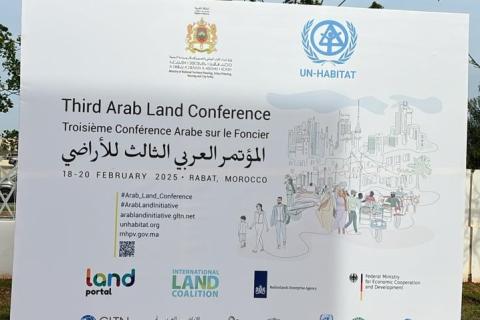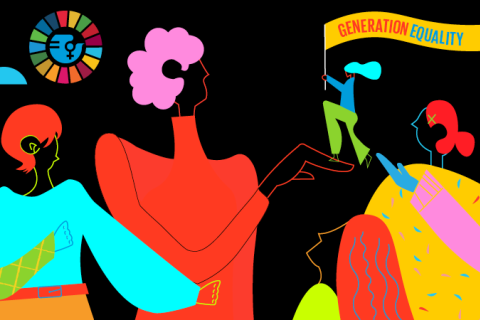Between commitments and action: Milestones from the Third Arab Land Conference
The Third Arab Land Conference, held in Rabat, Morocco from 18-20 February 2025 opened an avenue of possibilities for improving policies and practices to govern land in the Arab world. From the launch of several groundbreaking initiatives to empowering women and youth, and fostering data transparency and academic excellence, the event showcased commitments and collaborative work shaping the future of land governance in the region.
Land solutions for investments, resilience and innovation – Understanding how Land Governance contributes to Sustainable Development
Advancing women's land rights on International Women's Day 2025
On International Women’s Day, we reflect on the intersection of land rights and gender equity through a compilation of resources featured on the Land Portal’s platform. Women’s access to and control over land is fundamental to achieving sustainable development, economic empowerment, and social justice. However, despite international commitments, structural barriers continue to hinder women’s full participation in land governance.
Women and Land: Advancing Gender Equity in Land Tenure Across the Arab Region
How global climate initiatives can risk Indigenous women’s land rights
Recognizing Indigenous lands is important to achieving forest and biodiversity targets and mitigation goals. This is directly acknowledged in initiatives like the Global Biodiversity Framework’s 30x30 Target, Reducing Emissions from Deforestation and Forest Degradation in Developing Countries (REDD+) and Net Zero by 2050.
However, the actions necessary to achieve these targets can sometimes result in pressure and infringement on Indigenous and local land tenure systems that are already insecure due to lack of formal recognition and communities’ weak participation in decision-making related to climate initiatives. These pressures are experienced differently by women and men because of social, economic and political dynamics that influence land tenure and community governance systems. Failure to account for gender when implementing climate initiatives can risk eroding the traditional land entitlements of women and trigger additional negative impacts.
Breaking Ground: Professor Anju Vali Tikoo's Call for Gender Justice in Land Governance
Professor Anju Vali Tikoo, a distinguished academic with a career spanning over three decades, delivered a passionate and incisive keynote at the 8th India Land and Development Conference (ILDC). Her address, a clarion call for gender inclusivity in land governance, explored the intersection of law, policy, and lived realities for women in India. With her deep-rooted knowledge of legal frameworks and her personal experiences, Prof. Tikoo brought to light the systemic barriers that continue to marginalize women in matters of land ownership and decision making.
Diversity, equity and inclusion, feminist leadership, the Land Portal, and me
I recently had the opportunity to take part in two trainings to help me develop my leadership skills. It was time very well spent.
Why Funders Must Prioritise Land Rights for Women: Catalysing Economic Empowerment and Gender Equality in India
India has made significant strides in empowering women over the past few decades, starting with self-help groups (SHGs) that became powerful vehicles for social inclusion. Government and NGO efforts later expanded to skilling and livelihood initiatives, helping women increase their income and build small businesses within their communities. Yet, despite this progress, the urgent need remains for a long-term, sustainable solution to women's empowerment.
Exercising the governance muscle - why inclusive land governance matters
Inclusive land governance at the local level allows for the community’s broader governance ‘muscle’ to be exercised in a constructive and practical way. This can reduce conflict and spark transformative social change.
Inclusive Land Governance and Secure Land Tenure Rights
Webinar recap : Gender, Biodiversity and How Indigenous and Local Community Women Safeguard Nature
Under the umbrella of the Land Dialogues series, the first webinar of this year’s series “Gender and Biodiversity : How Indigenous and Local Community Women Safeguard Nature” took place on June 13th, 2024. The webinar drew in a little over 300 participants and featured Indigenous and local community leaders from around the world. The series is organized by a consortium of organizations, including the Land Portal Foundation, the Ford Foundation and the Tenure Facility and this particular webinar was organized in collaboration with the GATC.












